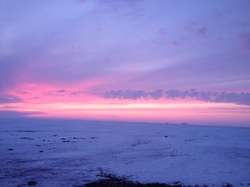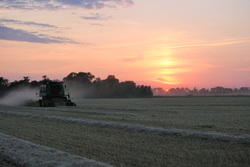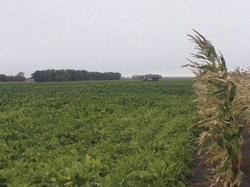


| Jensen Seed Company |
|
|
2014 is coming to a close, and although the year wasn't perfect, there are many reasons to celebrate.  This was April 14, looking west from our farm. We'd prefer to be in the fields by April 14, but this was a late, late, late spring. Fortunately, we were able to plant most acres. The late planting did have a negative effect on yields, but we made it through!  We often question whether or not to plant barley, but this year was a great year for barley. We were able to harvest the crop in mid-August, two weeks before we started wheat. It's so nice to get something harvested, and then catch our breath before wheat harvest begins. Plus, yields were better than expected. Barley doesn't like water, so we had low expectations after the wet spring and early summer, but our little barley plants made it!  The best news of 2014 was sugarbeet harvest. I hardly got any pictures because harvest went so fast (here's the harvester way in the distance). Yields were a little disappointing because of late planting, but we finished in record time, with only one minor shutdown for rain. If only every sugarbeet harvest could go that well. Two years ago we ended up leaving sugarbeets in the field, in the mud and snow, so this year's harvest really was a gift. 2014 will not be remember for amazing yields or high prices, but it was a good year. I hope you had a great 2014, and may 2015 be even better.
0 Comments
I saw this great webinar from the University of Minnesota on locally grown food. The speakers look interesting, topics are diverse, and best of all, it's free! What a great way to learn about local food, and maybe even how to begin growing your own food.
http://localfoods.umn.edu/college I think the local food movement is great. I am appreciative that consumers want to know what they're eating, and how it's produced. My concern is the sources that many consumers are looking to for information. The internet can make idiots out of the smartest people if they are not careful about checking sources. I know I live in a rural area, surrounded by farmers, but I find it hard to believe that consumers have NO connection to a farmer. There has to be someone they can call up and ask questions when something sounds fishy. My blood pressure rose this Thanksgiving when I saw turkeys labeled "Hormone free." All turkeys are hormone free! Hormones are not use by turkey farmers. Calling a turkey "hormone free" is like labeling water "Now with hydrogen and oxygen." It's a marketing ploy, and not a legitimate health concern. So find a farmer. Ask questions. Attend some webinars by the University of Minnesota. And enjoy your food. We've never had food this safe, healthy and abundant, and it doesn't happen by accident. It happens because of hard work by farmers, unseen by almost every consumer. |
AuthorThis is what I get for majoring in agriculture economics at North Dakota State University. A farm near the Canadian border, far from any delivery restaurants or shopping centers. Sometimes in life you get nothing that you prayed for, and yet so much more than you asked. Life doesn't have to be easy to be wonderful and blessed. Archives
January 2018
Categories
All
|